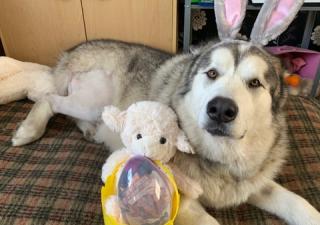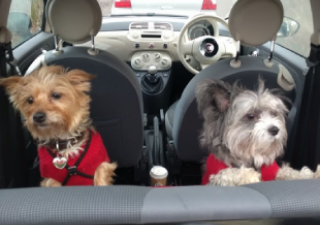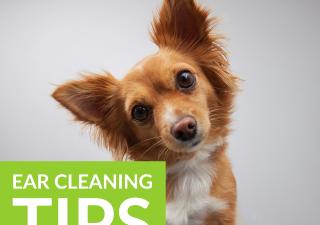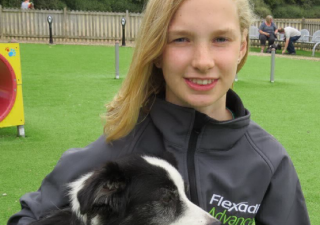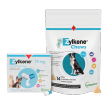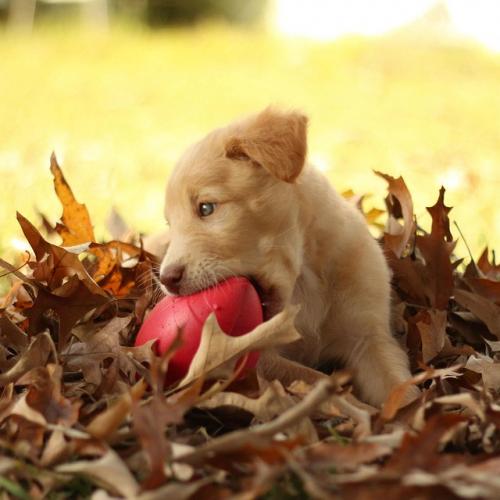
It is my dog’s first firework season – what should I do?
Back to overviewIt is my dog’s first firework season – what should I do?
Many puppies and older dogs will instinctively be a little unsure when they first hear fireworks, as they won’t understand where they are coming from and so be able to decide whether they are potentially harmful or not. You won’t know how your puppy or dog is likely to react until they hear fireworks for the first time, as even if you have played recordings in preparation they may still need time to adjust to the difference in quality between the recordings and the real firework experience. It therefore pays to be prepared.
Will my dog get used to the firework noises?
Dogs can learn not to be bothered by almost anything as long as they don’t feel threatened by it. This process is called habituation and is nature’s way of filtering out things that are not of any importance. Puppies accept new things most readily when they are very young (typically under 9 weeks old). However, older puppies and adult dogs can habituate to new things at any age as long as they don’t see them as potentially harmful or link them to the unpleasant sensations of fear. You can therefore help your puppy or dog habituate to the sound of fireworks by ensuring their first experience is a positive one.
Keeping your puppy or dog safe
As you do not yet know how your puppy or dog is likely to react to fireworks it is important to take steps to ensure he or she cannot be hurt if they react badly. Make sure you walk your dog before dark and if you take them out to empty their bladder or bowels once the fireworks are over keep them on a lead in case there are any late ones. Ensure windows and doors are closed whilst fireworks are being let off, so your dog cannot jump out of a window or bolt from the house if he or she panics. Also avoid doing anything your dog is bothered by e.g. if your dog is fearful of the vacuum cleaner then avoid using this at the same time as the fireworks.
Aim to stay with your dog during any expected fireworks
Not all fireworks are predictable but many are, such as around celebrations that traditionally involved fireworks and bonfire night parties. Aim to stay at home with your dog during their first firework experiences. Most dogs are reassured by not being alone and you will be able to take steps to support your dog if he or she does show signs of being worried.
Should I pay attention to my dog if he or she is scared?
Dogs are strongly social animals and are known to look to others in their social group, including their owner and other dogs they live with, when deciding whether something poses a threat or not. They will also seek reassurance from others if they are scared.
It is fine to offer your puppy or dog reassurance if they are seeking it. Often cuddling up to you or a calming hand can go a long way to helping your dog realise there is nothing to be worried about. When doing so keep in mind that your dog will be guided by your own mood and behaviour when deciding whether the noises pose a danger. It is therefore important that you remain calm and relaxed when doing so, and that you pay no attention to the noises, so your dog can see you don’t think there is anything to be worried about.
It is sometimes suggested that owners should ignore their dog if they show signs of being afraid, so they don’t ‘reward’ their fear with attention. Dogs can’t choose whether to be fearful and so it isn’t possible to ‘reward’ fear or for the dog to choose to feel fearful to get extra attention. Even if they could – it is very unlikely they would! However, ignoring is a strong punishment, especially to a fearful dog. As a result of ignoring your dog they may become more worried by the fireworks, as they will start to link them with being ignored by you. It is therefore important not to ignore your dog.
Providing a refuge
Whilst most dogs will choose to stay close to you if they are worried, some may prefer a hiding place. Left to their own devices they will often hide in the back of cupboards or under beds. You can help by ensuring your dog always has access to a place they feel safe in and as close to you as possible when fireworks are going off.
Create a refuge that is large enough for your dog to stand up and turn around in, but small enough to feel cosy. This can be a crate, cosy cupboard or a piece of adapted furniture e.g. a small side table next to your armchair. Cover it all but one side so it has a cave-like feel and drowns out noise, and line it with thin layers of blankets so your dog can hide underneath them. Rotate washing the blankets so that you can balance maintaining hygiene with ensuring at least one of the blankets has your dog’s own reassuring scent on it all the time. It may also help to put something you have had close to your skin in the refuge, such as an unwashed t-shirt or pillowcase. This will be particularly reassuring if fireworks unexpectedly happen when you are not there.
Set the den up at least a week or more in advance of anticipated fireworks so your dog has already become familiar with it. Encourage him or her to use it by putting toys and treats in or feeding in the den. Make sure your dog always has access to the den, especially when you are out, but is never trapped in it. The den is intended to be a refuge in which your dog can get away from the scary noises. Locking him or her in would increase their fear as they would feel trapped and so unable to get away from the threat.
Would it help to use pheromones or products intended to reduce anxiety?
Pheromones and medications intended to ease anxiety can be very useful when a dog is afraid of fireworks. If you feel your dog is generally quite anxious, or has not yet settled in to his or her new home when the fireworks season starts, these products may be useful to help support the habituation process. For more information see the blog ‘Are there any products that can help my dog relax during fireworks?’.
What should I do if my dog reacts badly?
If your dog starts to become strongly fearful during the fireworks then aim to help him cope as discussed in the blog ‘My dog is afraid of fireworks – what should I do?’. You can then teach him not to be worried by them as discussed in the blog ‘How can I teach my dog not to be fearful of fireworks?’ once the season is over. If your dog is strongly fearful and you can’t seem to be able to help him cope then seek the advice of a Clinical Animal Behaviourist as soon as possible.
Stephanie Hedges BSc (Hons) CCAB
Canine Behaviour Counsellor
Full member of the Association of Pet Behaviour Counsellors
ASAB Certified Clinical Animal Behaviourist (CCAB)
Animal Behaviour & Training Council (ABTC) Registered Clinical Animal Behaviourist
Tips & Tricks
- Easter is a wonderful time of year with so many chocolate Easter eggs in abundance, but make sure you do not let your pet near them.
- With Brexit deal still in negotiation and a possibility of a ‘no deal’ scenario, there are no concrete answers just yet – but to help you become more informed, here is our Q&A on what we can find so far.
- Build-up of wax and debris in your pet's ear canals can lead to discomfort and irritation. Cleaning your pet’s ears can have a lot of benefits and here are some tips to get you started!
- We had a great time catching up with Mariann Bayliss, our sponsored agility handler last week. We met her competing dog, Ila, and her 5 month old puppy Coral.

